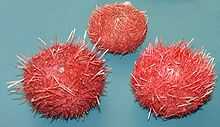Echinidae
| Echinidae Temporal range: Miocene–Recent | |
|---|---|
 | |
| Sterechinus neumayeri | |
| Scientific classification | |
| Kingdom: | Animalia |
| Phylum: | Echinodermata |
| Class: | Echinoidea |
| Subclass: | Euechinoidea |
| Order: | Echinoida |
| Family: | Echinidae Gray, 1825 [1] |
| Genera | |
|
| |
Echinidae is a family of sea urchins in the order Echinoida. Members of the family are found in the Atlantic Ocean and the Antarctic.[2]
Characteristics
Members of the Echinidae family are characterized by having trigeminate ambulacra (quadrigeminate in one genus) with pairs of tube feet pores arranged either as vertical arcs or as a dense band. The ambulacral plates are compound. The tubercles are imperforate and do not have crenulate edges. There are few tubercles on the interambulacral plates. The buccal notches are reduced in size and, their most significant distinguishing feature, the pedicellariae are globiferous and have one or two pairs of lateral teeth on the narrow tubular blades.[2][3]
Genera
According to the World Register of Marine Species (WoRMS), the following genera are included in the family: [1]
- Dermechinus - Mortensen, 1942
- Echinus - Linnaeus, 1758
- Gracilechinus - Fell & Pawson, in Moore, 1966
- Polyechinus - Mortensen, 1942
- Sterechinus - Koehler, 1901
- Stirechinus - Desor, 1856 †
References
- ↑ 1.0 1.1 Echinidae WoRMS. Retrieved 2011-08-28.
- ↑ 2.0 2.1 Family Echinidae Gray, 1825. The Echinoid Directory. Retrieved 2011-08-28.
- ↑ True Sea-urchins (Family Echinidae) Marine Species Identification Portal. Retrieved 2011-08-28.